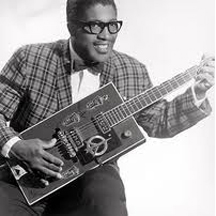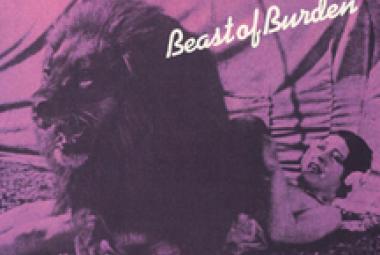Bo Diddley (December 30, 1928 – June 2, 2008) was an American R&B and Chicago Blues vocalist, guitarist, songwriter and music producer (usually as Elias McDaniel). He was known as The Originator because of his key role in the transition from the blues to rock and roll, and rock. He introduced more insistent, driving rhythms and a hard-edged electric guitar sound on a wide-ranging catalog of songs, along with African rhythms and a signature beat (a simple five-accent clave rhythm) that remains a cornerstone of hip hop, rock and pop. He was known in particular for his technical innovations, including his trademark rectangular guitar. (More from Wikipedia)
Keith Richards once said of Buddy Holly that he had “an influence on everybody”. Richards heard Buddy perform “Not Fade Away” in concert; as only their third single, the Rolling Stones hit #3 on the UK charts with “Not Fade Away” (performed in the Bo Diddley style that was the genesis of the song in the first place) – and that song is my very favorite Rolling Stones cover song.
Ritchie Valens released just two 45’s but still showed incredible versatility. His first, “Come On, Let’s Go” is now regarded as a straight-up rock and roll classic, but it failed to chart. Writing in 1998, Billy Vera recalls “first hearing [“Come On, Let’s Go”] on Alan Freed’s TV Dance Party, a local New York equivalent of Dick Clark’s American Bandstand. It was a record which really grabbed my teenaged ears. I had never heard anything quite like it. It had a much ‘thicker’ sound than anything by Elvis, Chuck Berry, Gene Vincent or even Eddie Cochran. For thickness, the only thing that came close was Bo Diddley.”
(June 2013/1)
* * *
Besides Mouse and the Traps (officially Mouse and Positively 13 O’Clock), the only other band to be featured on the original Nuggets album and also on Pebbles, Volume 1 is the Shadows of Knight. The Nuggets song is their cover of a terrific Bo Diddley song, “Oh Yea”; while the Pebbles entry is a novelty song by the band called “Potato Chip” that was issued only on a flexi disc as part of some snack food promotion.
(September 2013)
First on the agenda for Mick Farren as the Sixties came to a close was to fulfill his recording contract after he was thrown out of his own band. In March 1970, Farren released Mona – The Carnivorous Circus; essentially, this was Mick Farren’s first solo album, although the album is often credited to the Deviants. The album is bookended by the great Bo Diddley song “Mona”, though the largest part of the album was the meandering two-part “Carnivorous Circus”. There is also a rendition of the great Eddie Cochran song that was later made famous by the Who, “Summertime Blues”; their first release of “Summertime Blues” was on their 1970 Live at Leeds album.
“Rollin’ Stone” by Muddy Waters is a bridge from the raw blues of Robert Johnson directly to rock and roll; while it is basically a straight blues song, there are startling changes in the beat and cadences over the course of “Rollin’ Stone”. Within the blues world, it is a direct antecedent to Muddy Waters’ 1954 recording of the Willie Dixon song “I’m Your Hoochie Coochie Man” (Steppenwolf included “Hoochie Coochie Man” on their 1968 debut album Steppenwolf, among numerous other covers by various rock musicians), Bo Diddley’s “I’m a Man” (1955), and Waters’ answer “Mannish Boy” (also in 1955). I suppose that Bo and Muddy had a pretty good rivalry going back then, but on several occasions, I saw a performance of “I’m a Man” by Muddy Waters in later life on a series of films on TV called Living Legends of the Blues – that rendition even leaves the cover of “I’m a Man” by the Yardbirds in the dust.
The band’s first album, Cactus was one of the best hard rock albums of 1970. The album opens with a fierce version of the Mose Allison song “Parchman Farm” (about the notorious Mississippi State Penitentiary of that name) – and not long after Blue Cheer recorded that classic blues song (misnamed “Parchment Farm”) on their debut 1968 album, Vincebus Eruptum – plus the Willie Dixon song “You Can’t Judge a Book by the Cover” that was made famous by Bo Diddley. But Cactus’s own songs rock just as hard, like “Let Me Swim”, “Oleo” and “Feel So Good”.
(April 2014)
* * *
As with many of the British Invasion bands, the Yardbirds initially played American R&B and blues songs rather than their own compositions. As reported in Wikipedia, during their days at the Crawdaddy Club: “They drew their repertoire from the Chicago blues of Howlin’ Wolf, Muddy Waters, Bo Diddley, Sonny Boy Williamson II, and Elmore James, including ‘Smokestack Lightning’, ‘Good Morning Little School Girl’, ‘Boom Boom’, ‘I Wish You Would’, ‘Rollin’ and Tumblin’’, and ‘I’m a Man’.” In fact, Eric Clapton left the Yardbirds in March 1965 as a protest when the band finally got a hit single with a song that did not come from this milieu, “For Your Love” (written by Graham Gouldman, later a member of 10cc).
(May 2014)
* * *
The name of the Crawdaddy Club is taken from a song by Bo Diddley called “Doing the Craw-Daddy”; the Rolling Stones regularly included this song in their set while performing at the club. The song is taken from Bo’s fifth album, having the unusual name of Bo Diddley Is a Gunslinger; the cover shows the man decked out in Western wear with a black ten-gallon hat and an electric guitar at his feet.
* * *
Jeff Scott phoned Ron Silva, and they patched things up over Silva’s leaving the Hitmakers. Scott was about to go to L.A. to play their band’s demo tape for Greg Shaw at Bomp! Records, and he offered to bring him and Steve Potterf along if they could lay down some tracks first. The Crawdaddys assembled in the Silva garage and recorded two original songs plus Chuck Berry’s “Oh Baby Doll” and Bo Diddley’s “Tiger in Your Tank”.
Remarkably, the Crawdaddys filmed their performance of another Bo Diddley song in 1978, “Cadillac”; this was a full three years before MTV signed on the air. The film was made for a college Communications class that Mark Zadarnowski was attending.
As described above, the resulting debut album, Crawdaddy Express by the Crawdaddys was comprised mostly of covers of R&B classics by Bo Diddley, Willie Dixon, Chuck Berry, and John Lee Hooker; plus a few from other sources, such as the old Hank Snow tune “I’m Movin’ On” and the magnificent Van Morrison song “Mystic Eyes” that opened the first album by Them. Only a few familiar songs were included on the album, such as “You Can’t Judge a Book” and “Down the Road a Piece”. Just two original recordings were included on the album, the title song “Crawdaddy Express” and “Got You in My Soul” (both written by Ron Silva and Steve Potterf).
* * *
Of course, more than a few 1960’s fans such as yours truly might have expected yet another Bo Diddley song on the Crawdaddys’ CD called Here ’Tis, not coincidentally entitled “Here ’Tis”; but it is not among the tracks. I have two versions of the song; one is by the Yardbirds, and another that is even better is by the Betterdays. The latter version of “Here ’Tis” is included on the Pebbles, Volume 6 LP that introduced me to the raw English R&B sound that inspired the creation of the Crawdaddys in the first place.
(January 2015/2)
* * *















